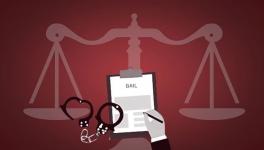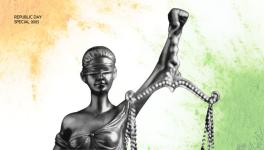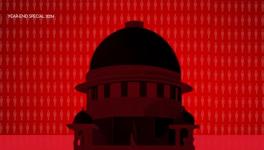Challenging the “Miniscule Minority” Tag by the Supreme Court in 2013

“The whole problem before Your Lordships is human condition” argued Ashok H Desai, a Senior Advocate in the Supreme Court, questioning the constitutionality of Section 377 of Indian Penal Code (IPC). On July 11, 2018, the Additional Solicitor General (ASG) Tushar Mehta, representing the Union Government in the Court and unveiling its stand on Section 377, announced that the central government will not be contesting the court’s verdict. The Union Government submitted an affidavit to the court, saying that it would not be contesting the judgement regarding the constitutionality of section 377 and urged the court to limit the scope of its hearing to the constitutionality.
Also Read: Ray of Hope in the Legal Battle of the Queer Movement in India
A Curative Petition presented in Court challenged the Court’s Judgment in the case of Suresh Kumar Koushal vs. Naz Foundation. In this judgement, the Court had rejected Delhi High Court’s judgement in the case of Naz foundation vs. Government of NCT, Delhi, and had upheld the constitutionality of Section 377. In its earlier judgment, the Supreme Court, addressing the sexual minorities as “miniscule minority”, had ruled out the size of effects of this section. Five years later, on August 14, 2018, the same court in the case of Justice K.S. Puttaswamy vs Union of India, upheld privacy as a fundamental right. This judgement, making privacy a fundamental right, created a space for the queer to legally question the logic of the Supreme Court to uphold the Section because it affects “miniscule minority.”
Also Read: Section 377 IPC Could Potentially be Struck Down if Not Read Down
Advocate Shyam Divan invoked the judgement of the Court in the case of Shayara Bano v. Union of India & Others, popularly known as the Triple Talaq case. Paragraph 62 of the judgement discusses “equality before the law” and “equal protection of law.” Divan argued that a positive action on part of the state is necessary for homosexual persons- which is the protection by the law and therefore the “Supreme Court should not have re-criminalised homosexuality.”
Marking the violation of rights and freedom of homosexual persons because of the draconian IPC Section 377, advocates, Ashok H Desai, CU Singh, Shyam Divan, Manoj George, Menaka Guruswamy and Krishnan Venugopal presented their arguments in front of the bench in today’s hearing.
The social stigma around homosexuality and the Law
Queer persons face social stigma on an everyday basis. As the advocates representing the petitioners argued in court today, Section 377 makes it all the more difficult for them. The Section legitimising this stigma makes it difficult for the queer persons to exercise their rights and excludes them from the ambit of rights and freedom enjoyed by other citizens of India. Identifying this, Justice Indu Malhotra remarked that, “This community feels inhibited to go for medical aid due to prejudices against them”. She also noted that, due to “family and societal pressures they are forced to marry opposite sex persons” and such a “traumatic existence” is maintained by the Section 377.
Also Read: Revisiting the Battles Around Section 377 of the Indian Penal Code
The impact of section 377 on queer lives was undermined in the Koushal judgement. Desai argued that Section 377 has “created utter chaos” and that a few convictions uder this section cannot be the grounds on which the Court can support such a law. As Krishnan Venugopal argued in the Court today, the section is used to harass “LGBT persons, who do not speak up due to stigma and societal perceptions.” Venugopal further argued that the section forces one to suppress alternate sexualities and violates freedom of expression and Association (Article 19). Referring to the Court’s judgments in earlier cases of Justice Puttaswamy, Hadiya, and Lawrence v. Texas, Divan argued that the Section violates Article 19. Justice Chandrachud, one of the five judges on the panel also referred to Section 21a of the Mental Health Act, and argued that it prohibits discrimination on the ground of Sexual Orientation.
The Section, which was introduced to the IPC in 1860 by Lord Macaulay, is based on the Victorian morals and has legally made the queer persons in the country vulnerable ever since. Senior advocate C U Singh argued that, “Having faced criminalisation for over 160 years, it is a huge step to strike it down. But whenever there has been historical deep-rooted discrimination, the State has resorted to affirmative actions.”
Also Read: Supreme Court Issues Notice to the Government On Section 377
The bench will be listening to the intervenors on Tuesday, next week. The arguments put forward in the Court today, introduces a perspective to the unconstitutionality of the Section 377. Justice Chandrachud had noted on the first day of the hearing that, “Section 377 criminalises a class of people; to say that it criminalises an act and not a class of people is not correct.”
The hearings so far has made “a class of people” the focal point, where the question is actually about the violation of constitutionally guaranteed rights and freedom for “a class of people”, and the impact that the section has on the everyday lives of this class of people.
Get the latest reports & analysis with people's perspective on Protests, movements & deep analytical videos, discussions of the current affairs in your Telegram app. Subscribe to NewsClick's Telegram channel & get Real-Time updates on stories, as they get published on our website.
























